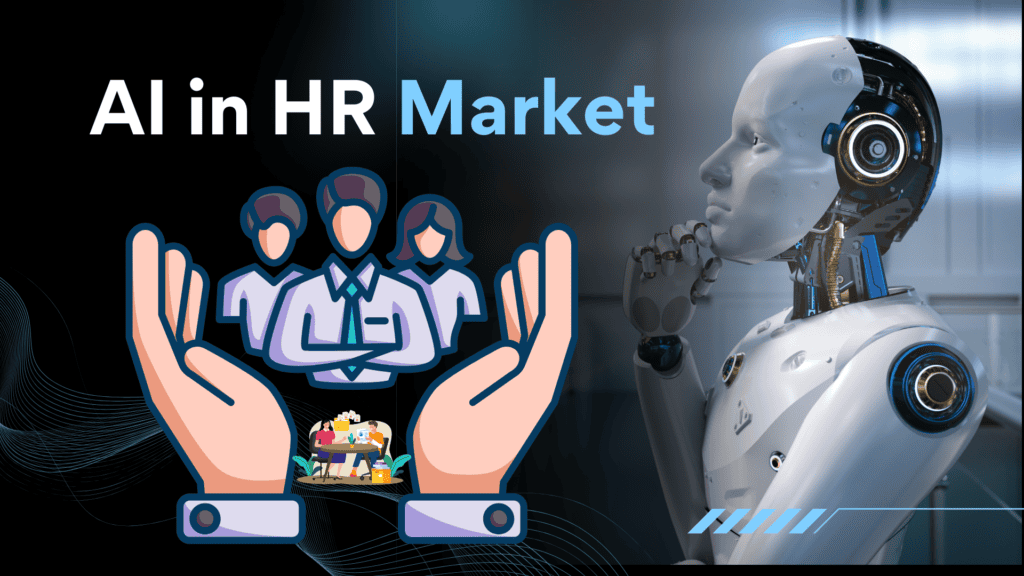Introduction
The Global AI in HR Market is expanding steadily as organizations adopt artificial intelligence to streamline recruitment, employee engagement, and workforce management. Valued at USD 5.9 Billion in 2023, the market is projected to reach nearly USD 26.5 Billion by 2033, growing at a CAGR of 16.2% from 2024 to 2033. This growth is being fueled by rising demand for automated talent acquisition, predictive analytics for workforce planning, and AI-powered platforms that enhance employee experience and organizational efficiency.
The AI in HR market refers to the use of artificial intelligence technologies to improve and automate various human resource functions. These functions include recruitment, employee onboarding, performance management, payroll, and workforce analytics. AI enables organizations to process large amounts of data quickly, streamline HR processes, and make more informed decisions. This transformation is helping HR departments move from manual, repetitive tasks to more strategic activities that add value to the business.
The top driving factors for the AI in HR market include the growing need for automation to increase efficiency and reduce the time spent on administrative tasks. AI tools automate resume screening, candidate sourcing, training, and employee engagement processes. Another significant driver is the demand for data-driven decision-making with predictive analytics that help organizations plan workforce needs, identify skill gaps, and improve talent management. Additionally, the increasing adoption of AI platforms that provide personalized employee experiences and improve retention rates fuels market growth.

In 2023, the adoption of Artificial Intelligence within Human Resources has marked a significant shift in operational practices. Around 75% of HR departments are now using AI-powered tools for resume screening and candidate selection, streamlining the hiring process and ensuring faster, more accurate matching of candidates with job requirements. These applications, powered by AI and machine learning algorithms, are redefining how organizations attract and evaluate talent.
Employee satisfaction and retention have also become focal points, with nearly 82% of HR teams leveraging AI-driven sentiment analysis tools. These systems enable real-time monitoring of workforce morale and the early identification of potential retention challenges, giving companies the opportunity to intervene proactively and maintain a positive organizational culture.
Learning and development strategies are equally benefiting from AI integration. About 70% of HR managers have adopted AI-enhanced platforms to deliver personalized training programs, resulting in a 12% increase in employee engagement. This highlights AI’s role in creating adaptive, employee-focused development pathways that foster productivity and long-term workforce growth.
Key Insights
- The AI in HR Market is projected to reach USD 26.5 Billion by 2033, growing at a strong 16.2% CAGR from 2024 to 2033.
- The Solutions segment led in 2023 with 70.9% share, supported by the rising use of AI tools to improve HR efficiency and decision-making.
- Cloud-based deployment was the preferred model, accounting for 72% share in 2023 due to its flexibility, scalability, and cost benefits.
- Machine Learning (ML) dominated the technology segment, securing 59.7% share, with key roles in recruitment and performance analysis.
- Recruitment and Hiring was the leading application, contributing 29.5% share in 2023 as AI improved candidate matching and accelerated hiring cycles.
- North America was the top regional market in 2023, holding 38.4% share, supported by strong infrastructure and early digital adoption.
Analysts’ Viewpoint
Technologies increasingly adopted in AI for HR include machine learning, natural language processing, and advanced analytics. Machine learning algorithms enhance candidate matching and predictive talent forecasting. Natural language processing powers chatbots for candidate engagement and employee support. AI-driven analytics platforms provide real-time insights into workforce dynamics. These technologies enable automation of routine tasks like interview scheduling and payroll processing while delivering strategic insights to HR leaders.
Investment opportunities in the AI in HR market arise from the continuous demand for innovative AI-powered HR tools and platforms. Enterprises are investing in AI solutions that enhance recruitment efficiency, workforce planning, and employee engagement. Startups and established vendors offering AI-based recruitment software, talent analytics, and employee experience platforms attract funding due to the expanding adoption across industries globally. The focus is also on improving AI capabilities for unbiased hiring and personalized employee development.
Business benefits of AI in HR include increased operational efficiency, reduced time and costs in recruitment and administrative tasks, and enhanced quality of hires. AI helps organizations make data-driven HR decisions, leading to better workforce planning and talent retention. Employee engagement improves with AI-powered personalized experiences and timely support. AI also mitigates errors in payroll and compliance, ensuring more accurate and fair HR processes, which strengthens the overall organizational culture and productivity.
Driver Analysis
Automation Enhancing HR Efficiency
One key driver propelling AI adoption in human resources is the rising demand for automation to streamline HR operations. AI technologies automate time-consuming tasks such as candidate screening, resume evaluation, interview scheduling, and employee performance analysis. This automation eliminates many manual steps, reducing hiring time and improving the quality of talent acquisition. Organizations, especially those with large workforces or high turnover, benefit from AI’s ability to handle vast amounts of data to identify the strongest candidates quickly and without bias.
The automation of these routine processes allows HR teams to focus more on strategic activities that add value to the organization. Moreover, AI-driven workforce analytics enable HR professionals to gain deeper insights into employee productivity, engagement, and skill gaps. These data insights help improve workforce planning and retention strategies effectively.
By offering personalized support such as tailored training and career development plans, AI enhances employee satisfaction while optimizing organizational performance. This growing operational efficiency and enhanced employee experience are major reasons why AI continues to gain traction within HR functions.
Restraint Analysis
Lack of Trust and Understanding Among HR Professionals
Despite the promising benefits, a significant restraint hindering AI adoption in HR is the limited trust and understanding of AI technologies among HR professionals. Surveys show that many HR leaders feel uncomfortable relying on AI-driven tools for critical decisions such as candidate evaluation or performance management. This skepticism often arises from unfamiliarity with how AI algorithms operate and concerns over the validity and fairness of AI outputs.
Without adequate knowledge, many HR teams hesitate to fully integrate AI into their workflows, fearing it might negatively impact decision quality. Additionally, challenges related to data privacy and security contribute to this restraint. HR departments handle sensitive employee information, and there are strict regulations governing data use.
Organizations must ensure AI solutions comply with laws like GDPR to protect employee privacy, which requires careful selection and management of AI tools. These combined factors of trust issues and privacy concerns slow down the widespread acceptance and incorporation of AI in HR environments.
Opportunity Analysis
Personalized Employee Experiences and Learning
AI presents a significant opportunity to transform employee engagement by delivering highly personalized experiences that meet individual needs. AI-powered platforms can design tailored onboarding programs, customized training modules, and ongoing career development plans that adapt to each employee’s unique skills and learning pace. This personalization fosters a sense of value and motivation among employees, leading to higher retention rates and improved productivity.
The rise of hybrid and remote work further boosts this opportunity. AI can support virtual collaboration, real-time feedback, and automated assistance via chatbots to keep employees engaged regardless of location. With AI’s predictive analytics, HR teams can anticipate skill gaps and design learning paths proactively. This blending of technology with human-centric development is opening new avenues for organizations to build agile, skilled, and committed workforces.
Challenge Analysis
Integration and Skill Gap Issues
A major challenge faced by organizations adopting AI in HR is the seamless integration of AI technologies with their existing HR systems and processes. Many companies operate legacy systems that are not easily compatible with new AI applications. This incompatibility can lead to workflow disruptions, inefficient data exchanges, and the need for costly manual interventions that reduce the intended benefits. Ensuring that AI tools work smoothly with current HR information systems requires careful planning and technical expertise, which can be resource-intensive.
Another notable challenge is the lack of necessary technical skills within HR teams to effectively implement and manage AI solutions. Many HR professionals are not familiar with AI capabilities or how to leverage them strategically. This skills gap leads to underutilization of AI potential or poor decision-making when selecting and deploying AI tools. Continuous training and collaboration with IT specialists are essential to overcome these hurdles and maximize AI’s value in HR practices.
Key Market Segments
By Component
- Solution
- Services
By Deployment Mode
- Cloud-Based
- On-Premise
By Technology
- Machine Learning (ML)
- Natural Language Processing (NLP)
- Other Technologies
By Application
- Recruitment and Hiring
- Employee Onboarding and Engagement
- Employee Record Management
- Performance Management
- Payroll Processing
- Other Applications
Top Market Leaders
- IBM Corporation
- SAP SE
- Oracle Corporation
- Google LLC
- Workday Inc.
- ADP
- Cornerstone OnDemand Inc.
- SmartRecruiters Inc.
- Bamboo HR LLC
- Textio
- Visier Inc.
- Beamery
- Other Key Players
Source of information – https://market.us/report/ai-in-hr-market/












